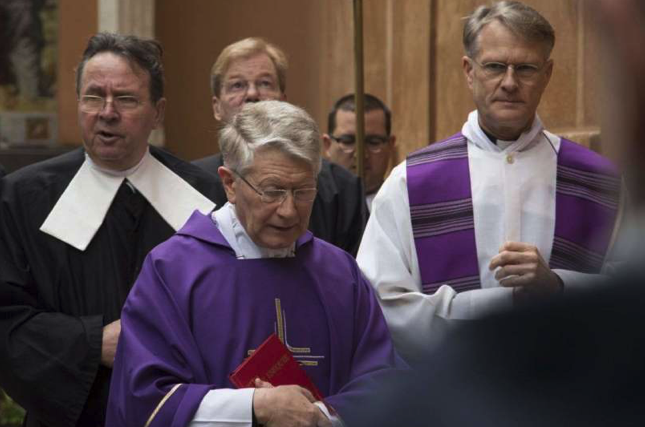‘God’s Tramp’ Who Suffered Like Job Given Vatican Burial
Cesar Willy De Vroe lost all his possessions but found the faith and became known for his generosity.

A homeless man from Belgium who had lost everything he ever had — family, possessions, and health — was given a Requiem Mass in the Vatican today and buried in the cemetery of the Teutonic College within the Vatican walls.
Cesar Willy De Vroe, 65, was born in Brussels to a prostitute and called himself “God’s tramp” after experiencing many bitter years living on the streets.
He eventually found refuge, first with Father Daniele Bisato, pastor of the parish of San Agostino in Ventimiglia, a coastal town in north west Italy, and then, since last September, with the Missionaries of Charity in Rome.
In his funeral homily, Msgr. Dirk Smet, the rector of the Pontifical Belgian College, said Cesar, one of four siblings who all lost contact with one another, had a life not unlike the biblical figure of Job in losing all he ever had.
But he discovered God and at the age of 47, was received into the Church.
He became well known for his generosity, according to Rome author Paul Badde, once saying: “Even though people don’t believe me, every time I give, or give something away, I have the same or get back twice as much that same day.”

He added that in the harshest of conditions, in his “total poverty and in his greatest abandonment,” he always knew how to “maintain a certain intelligence, a sensitive soul, a great human dignity.” He converted to the faith, he said, after life had “tested and hardened him in every way.”
But just as after his trials, Job would show great faith by proclaiming “I know that my Redeemer liveth!,” so the same words could be “put into the mouth of our dear ‘tramp of God,’ Cesar,” Msgr. Smet said.
The priest, who also noted that Cesar died Jan. 4, just before the feast of Epiphany, said the three Magi were not dissimilar to “vagrants of God,” setting out in search of the meaning of life, of God, who can give the “fullness of life and happiness.”
“The three Magi,” he continued, “are men of all colors and races, of all convictions and religions, of all classes, learned and simple, big and small, rich and poor, tramps and sick.
“In short,” he added, “the three Magi are us. And like the Magi of the Gospel, so we too are looking at a star that guides us towards the Child of Bethlehem, an incarnation of God's infinite love for us.”
“How precious are these stars on our journey of life, which give us enough light not to lose the courage to continue the good path to Bethlehem,” said Msgr. Smet.
“The darker our journey, the more we need the light of the star-guide.”
He ended by paying tribute to the Good Samaritans who had taken care of him, including a married couple, and said that “we too, following a credible star, can meet Jesus, even now in the Eucharist and in our brothers and sisters who are smaller and poorer, in the tramps just a few steps away from here, near the Vatican.”
Cesar had “reached the goal of his earthly pilgrimage,” Msgr. Smet said. “He has met the Son of God face to face” and after his “hard and long journey, immense joy and perpetual adoration can give him life, in eternal union with God, Father, Son and Holy Spirit. Amen.”
Cesar was buried alongside Willy Herteleer who in 2015 was the first homeless man in many years to be given a special Vatican burial.
Inset photo: From left: Paul Badde, Msgr. Dirk Smet, and the rector of the Teutonic College, Hans-Peter Fischer, at the funeral of Cesar Willy De Vroe, Jan. 11, 2018. (Photo: Collegio Teutonico / Marina Testino)













